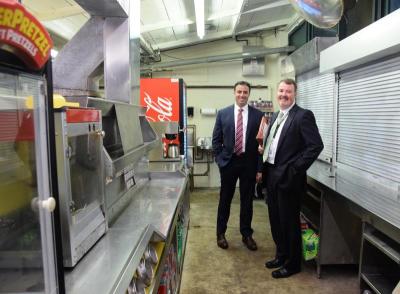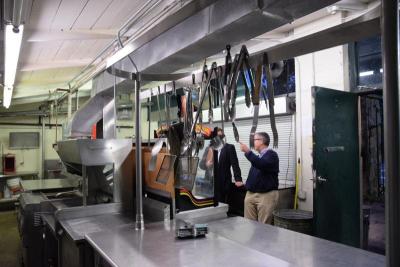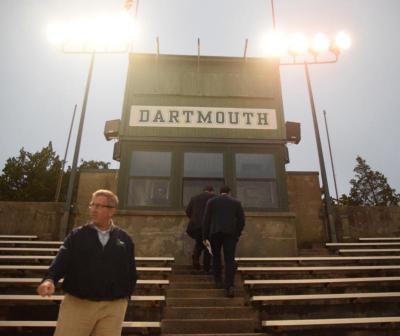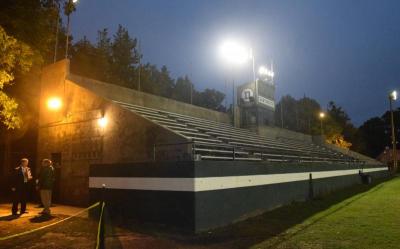Officials highlight need for renovated stadium with tour
Town, school, and sports officials believe now is the time to push forward with a renovation of Memorial Stadium.
On October 3, the Turf Field Committee — tasked with coming up with a plan to renovate the aging stadium — held its public meeting on location at the stadium. Officials presented a brief overview of the project, and led a tour highlighting areas which would be improved.
“I think the major problem that we have is two-fold: It’s lack of appropriate playing space in town — I think we all recognize that we’re short on fields in town — and that this particular field is sort of crumbling as we speak,” said School Business Administrator Jim Kiely.
During a tour of the site, Kiely pointed out the issues plaguing the aging facility. Many of the wooden lighting poles have large holes in them from woodpeckers.
Due to poor lighting during games, the announcer’s booth and press box do not provide a full view of the entire field. Announcers have difficulty tracking gameplay at field edges, and are often unable to identify which players have scored touchdowns.
Bathrooms are in poor condition, and the on-site kitchen is too small. Bleachers are old, lack railings, and do not comply with accessibility requirements.
The stadium has been in tough shape for years, but officials have struggled to put together a solid plan. In 2012, a committee was formed to analyze fields in town, and decided to focus on Memorial Stadium.
The current Turf Field Committee was formed in 2017 to develop a plan to move forward. Officials put forth a multi-phase renovation plan which would renovate the bleachers, lighting, field with artificial turf, entryways, and other modifications.
In 1950, Living Memorial Stadium was dedicated to serve as a “living memorial to [the people of Dartmouth’s] sincere feelings for the homes that were darkened” as Dartmouth residents went off to fight in World War II, with some giving the ultimate sacrifice for their country.
“We want this to remain a fitting memorial to the town, and we want to be sure it reflects the values and the original intent,” Kiely said.
Reconstruction would also require full code compliance, necessitating a large building dedicated to bathrooms, and an elevator in the press box building. Kiely noted buildings’ internal structures can be easily repaired and are in relatively good shape.
“The reality is you actually get more by renovating this than by building a new structure,” Kiely said.
The first phase of the project would include the replacement of the field lighting and turf field. Phase 2 would target the home stadium and entryway, while a later phase would renovate the visitor stadium, add a shade shelter and a storage building, and other improvements to that area.
Although cost estimates including contingencies came in higher initially, the estimated cost of Phase 1 is $1.7 million. Phase 2 is estimated to cost $1.9 million, while the final phase could be $1.3 million.
So far, Town Meeting members approved $50,000 to study for an architect to develop the plans, and an as-yet unspent $400,000 "downpayment" on the project, which will go towards Phase 1 construction.
On October 16, Town Meeting members will be asked to approve $1.1 million to fund Phase 1. Combined with the money already approved, School Choice funds which neighboring districts pay to Dartmouth schools to send their students to Dartmouth, and fundraising, it will cover the cost of Phase 1.


















